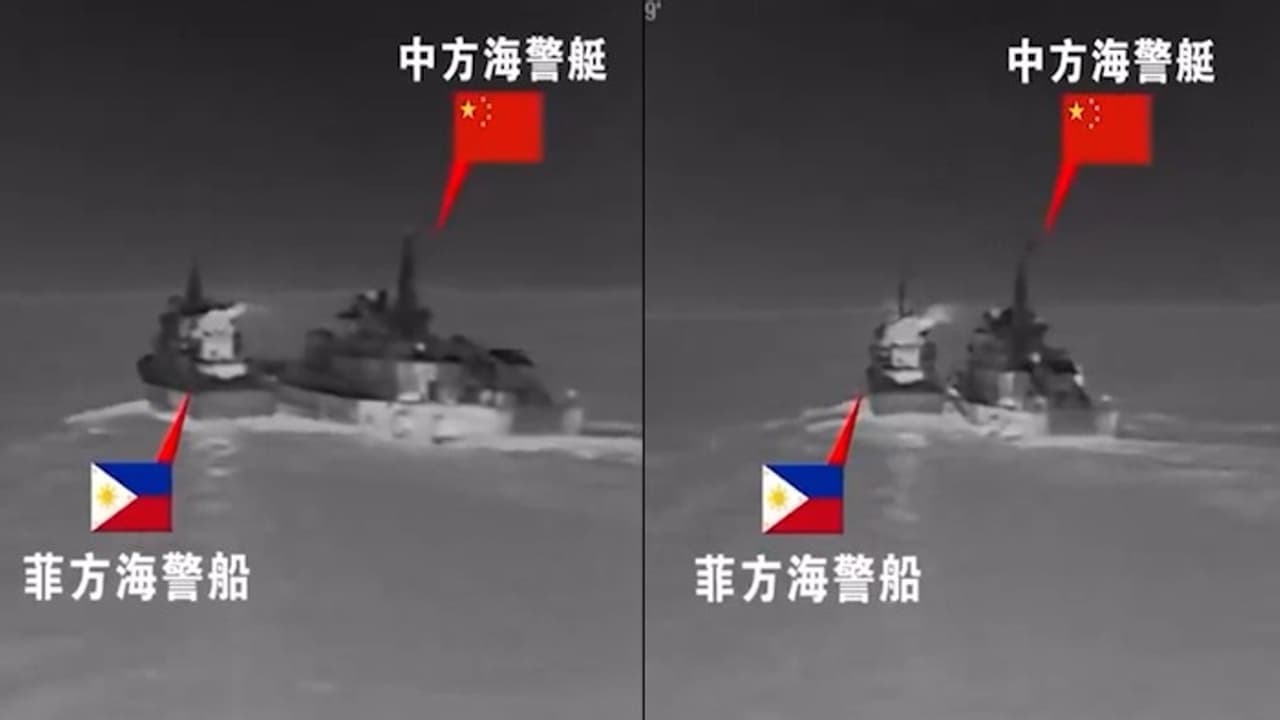Tensions have once again erupted in the West Philippine Sea (WPS) following a collision between vessels of the Philippine Coast Guard (PCG) and China Coast Guard (CCG) near Escoda (Sabina) Shoal during a resupply mission on Monday.
Tensions have once again erupted in the West Philippine Sea (WPS) following a collision between vessels of the Philippine Coast Guard (PCG) and China Coast Guard (CCG) near Escoda (Sabina) Shoal during a resupply mission on Monday. The incident has further strained the already volatile situation between Manila and Beijing over territorial disputes in the South China Sea.

The PCG vessels, BRP Bagacay (MRRV-4410) and BRP Cape Engaño (MRRV-4411), were on a mission to deliver supplies to Philippine troops stationed on Patag (Flat) Island and Lawak (Nanshan) Island. Both islands are part of the nine maritime features occupied by the Philippines in the Spratly Islands, a region fraught with territorial claims from multiple nations.
According to the National Task Force for the West Philippine Sea (NTF-WPS), the PCG ships were subjected to "unlawful and aggressive maneuvers" by the CCG during their mission. The NTF-WPS reported that the first confrontation occurred around 3:24 a.m., 23.01 nautical miles southeast of Escoda Shoal. The BRP Cape Engaño encountered CCG vessel number 3104, leading to a collision that left a five-inch hole on the starboard beam of the Philippine vessel.
Shortly after, at approximately 3:40 a.m., BRP Bagacay, which was transiting 21.3 nautical miles southeast of Escoda Shoal, was allegedly rammed twice by CCG vessel number 21551. The first impact caused significant damage to the auxiliary room on the port side of BRP Bagacay, including a hole measuring 2.5 feet in length and three feet in width. The second ramming resulted in damage to thirteen stanchion posts and a one-foot dent on the starboard quarter of the vessel.
BRP Cape Engaño also sustained severe damage, including a 1.10-meter diameter hole on her starboard quarter and a 40-centimeter diameter damage to the engine exhaust.
Despite the damages, both PCG vessels continued with their mission to deliver essential supplies to the Philippine personnel stationed on Patag and Lawak Islands. The NTF-WPS emphasized the commitment of the PCG to ensure the safety and security of the Philippines’ maritime domain.
China's response
In contrast to the Philippines' account, China provided a different narrative of the events. The CCG accused the BRP Bagacay of "illegally intruding" into the waters near Xianbin Jiao, China's name for Escoda Shoal. According to CCG spokesperson Gan Yu, the Philippine vessel disregarded repeated warnings and navigational controls from the Chinese side, leading to the CCG taking "control measures in accordance with the law and regulations."
The CCG claimed that the Philippine side's actions violated a temporary arrangement between China and the Philippines regarding the resupply of necessities to BRP Sierra Madre, which is stationed at Ayungin (Second Thomas) Shoal. China warned that such actions "seriously infringe on China's sovereignty and severely undermine regional peace and stability."
Gan Yu further cautioned that the Philippines would bear all consequences of its "infringement and provocation."
Escoda Shoal is a strategically important location, situated 75 nautical miles (140 kilometers) from Palawan within the Philippines' 200-nautical mile exclusive economic zone (EEZ). The shoal serves as a rendezvous point for the Armed Forces of the Philippines (AFP) during resupply missions to Ayungin Shoal, another contested area in the South China Sea.
In April, the PCG deployed its largest ship, BRP Teresa Magbanua, to Escoda Shoal to deter illegal poaching and monitor suspected reclamation activities following the discovery of an unusual dumping of dead and crushed corals on the shoal’s sandbars.
Calls for restraint
The NTF-WPS reiterated the Philippines’ commitment to securing its maritime domain and safeguarding its national interests. The task force called for restraint and urged all parties to adhere to the United Nations Convention on the Law of the Sea (UNCLOS) and other relevant international laws to prevent further escalations.
“The National Task Force for the West Philippine Sea urges restraint and adherence to the United Nations Convention on the Law of the Sea and other relevant international laws to prevent further escalations and ensure the safety of all vessels operating in the region,” the NTF-WPS stated.
The collision at Escoda Shoal is the latest in a series of confrontations between the Philippines and China in the contested waters of the South China Sea. Earlier this month, on August 8, two Chinese air force multi-role fighters conducted dangerous maneuvers and dropped flares on a Philippine Air Force (PAF) aircraft during a routine patrol over Bajo de Masinloc (Scarborough or Panatag Shoal), further heightening tensions between the two nations.
